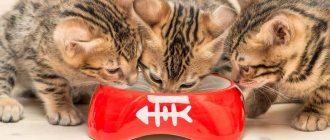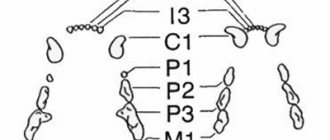After kittens appear in the house, the owner will immediately think about where to give these cute fluffy balls. However, an equally important point will be not only the place where the kittens will end up, but also the age at which they will be separated from the mother cat. In this article we will tell you when you can give away kittens, what age is optimal and why. You will also learn what exceptions exist and the negative consequences of premature separation from the mother.
Kittens are ready for independent living only at a certain age.
Stages of a kitten's life
Before getting down to the question of at what age it will be possible to give up kittens to other hands, it is necessary to study information about the stages of a kitten’s life that it simply must spend together with its mother cat.
In the life of a small kitten, the first few months are very important. They are of decisive importance, because he begins to learn about the world around him and develop. Everything he learns and learns as a skill will help him become a healthy adult animal. The owner of small kittens must understand how growth occurs at different stages, only then can he gain confidence that he is doing everything possible to create the best conditions for the normal development of small furry pets.
The first months are very important for the development of the kitten.
First week
After birth, the kitten immediately begins to suckle milk. As a rule, during the first three days of life, kittens choose their favorite nipple, and this preference continues until the end of the milk-feeding period.
It is necessary to attach the kittens to the mother's nipples as quickly as possible, preferably in the first hours after birth. Because it is during this period that the cat’s mammary glands begin to produce colostrum, a thick substance that contributes to the formation of the kittens’ immunity.
Around the fifth day, kittens open their eyes. At one week of age, their umbilical cord falls off. Weight gain ranges from 10 g to 30 g daily, so it is important to weigh the kittens every day and monitor the mother's behavior if she refuses to feed them.
It is important that kittens start drinking cat's milk right away.
Second - third weeks
At this age, kittens spend about 90% of their time sleeping. But sometimes they already try to get up. By the end of the third week, it is noticeable how rapidly they are growing. In addition, the first milk teeth appear - there will be 26 of them in total. But the molars will appear only at the age of five to seven months.
4 – 5 weeks
At one month of age, the kitten begins to explore the surrounding space, actively plays and communicates with other kittens, its brothers and sisters. At this age, kittens may already show interest in their mother's solid food. In this case, they can begin to be transferred from milk to a more suitable food. Gradually, kittens are offered food soaked in warm water or a specialized milk replacer, which will be easier for them to consume and digest.
Kittens actively communicate with each other
6–10 weeks
After reaching the age of two months, kittens, as a rule, stop receiving mother's milk and switch to self-feeding. You can switch kittens to a specialized food that will provide them with all the necessary nutrients and suit their size and texture. Kittens that are going to be sent to other homes must undergo a vaccination procedure. This issue can be discussed with your veterinarian.
After two months, kittens are ready to eat special food
Pregnancy and birth of a cat – what to expect?
If you are still thinking about the question of whether your cat needs to become a mother, read this section, perhaps it will change your vision. At sexual maturity, each animal begins to obey its instincts to look for a sexual partner. If everything goes well, mating occurs, after which the female bears the offspring for 2 months.
Throughout pregnancy, the cat’s body undergoes changes that affect literally all vital systems. The pet begins to produce more blood, since the body also provides embryos. Kittens develop quickly, which leads to increased consumption of proteins, carbohydrates and all nutrients.
While bearing offspring, the cat faces the discomfort that pregnant women often experience. The pet may suffer from vitamin deficiency, toxicosis and mineral deficiency. If the pregnancy proceeds successfully, the kittens are formed on time, after about 2 months the decisive moment comes - labor begins. At this stage, the cat faces the greatest danger - postpartum eclampsia. This condition is characterized by a sharp drop in all key blood parameters, including calcium and sugar.
In a state of postpartum eclampsia, a cat can quickly die or kill kittens.
Even if everything goes well, absolutely all cats suffer from dehydration and exhaustion after giving birth. The diet of a nursing cat should be maximally enhanced in accordance with the needs of the body. Regardless of age, breed or genetics, you can be sure that a nursing cat has calcium and mineral deficiencies. Constant milk production leads to greater consumption of water, proteins and vitamins.
The most difficult and critical time is the first three days after childbirth. During this period, the cat feeds the offspring with colostrum. The production of colostrum is necessary, since without it the microflora of kittens will be weak, and the babies themselves will not be able to digest milk.
A pregnant cat can be switched to an enhanced menu from the first week after mating. The problem is that owners of non-sterilized animals that have access to the street find out that their pet is pregnant by the fact that the belly “appears.” It is worth understanding that a noticeable rounding of the barrels occurs already in the second trimester. If you are faced with the fact that your pet is pregnant, it is recommended to switch the cat to a diet enriched with proteins and calcium. Be sure to give your cat a vitamin course and consult a veterinarian about your further actions.
Advice: if you do not want your cat to suffer from the hardships of bearing offspring, it is better to sterilize your pet before the onset of her first heat.
Statistics show that neutered, nulliparous cats live longer and have better health.
At what age can kittens be separated from their mother cat?
So, back to the question, when can kittens be given away or even necessary? You need to find good owners for them as soon as possible. But how can you separate kittens from their mother as painlessly as possible? How long should it take? Maybe when they stop eating the cat's milk and start eating on their own? Or is there some other reinforced concrete criterion?
Kittens can be separated from their mother no earlier than 12 weeks.
When people are looking for a new pet to add to their home, they want it to be very small, because it is so cute and funny. However, a responsible breeder or simply the owner of a large number of small furry animals will not sell or give away a kitten younger than twelve weeks.
Why was this age chosen?
There are two factors why the kitten was chosen at this particular age when it is time to give it to another home.
Factor one: in order to get used to a new home, the kitten must be young enough. Three-month-old kittens will need much less time to get used to their new surroundings and new people. They more easily perceive everything new that appears around them; their brain is just beginning to develop. Kittens have not yet had time to leave many memories of the place where they were born, so having received a lot of love and care in their new home, they can easily survive parting with their mother. Of course, with enough time and proper care, you can train an old cat to a new home. However, as a rule, the younger the cat, the faster and easier it is to form a bond between her and a person.
It is necessary to carefully monitor the kitten’s readiness to go to a new home.
Factor two: The kitten must spend enough time with its mother and brothers and sisters to learn the necessary rules of behavior. Some manifestations of character and habits are completely subordinate to instincts. Others are laid down by training. Some are related to both instinct and acquired experience. The best teacher for a kitten is the mother cat. Interacting with their siblings helps kittens establish the ability to socialize with other cats later in their lives. A few weeks in general company are necessary to acquire good cat manners. During play, for example, kittens learn to control and regulate biting and scratching.
Is it possible earlier than the recommended date?
To wean kittens from their mother cat, they should ideally be between twelve and sixteen weeks old. This is enough time to learn how to behave, but they are still young and flexible to quickly adapt to a new home. There are, of course, situations when a kitten must be given away before it turns twelve weeks old. But still, try to at least keep them with their mother until they are confident in eating solid food (usually at least eight weeks old). Every extra day spent with their mother cat will help their future mental and social development.
A mother cat can teach her babies a lot
Are there exceptions to the rules?
There is an exception to all rules. It is present here too. Feral kittens are such a case. These are kittens that were born to a street cat and have never had any contact with people. In this case, the need to learn to live with people outweighs their need to communicate with their mother and brothers and sisters. Because by staying with their mother for several months, the kittens will learn to be afraid of people. So, if you care for such a cat and her kittens, it is better to take them home as early as possible. They will calmly overcome their fear of people and successfully socialize. Of course, the ideal option would be one in which you take (and, therefore, save) both the cat and the kittens.
Kittens should be taken from the street as early as possible
Another exception would be the death of the mother cat immediately after giving birth. Then the newly born kittens need to be kept warm. They need to imitate the warm side of their mother, so a hot water bottle is placed in the box with the babies. The temperature of the heating pad should be 40 degrees. Babies are fed from a pipette or a special nipple. Cat milk or a milk substitute can be purchased at a pet store or veterinary pharmacy. The mixture is heated to a “steamy” temperature (this is +38 degrees) and fed to the babies. Up to 2 weeks, the cub should eat every 3 hours. From 2 to 4 weeks, the intervals between meals are increased to 4-5 hours. From 5 weeks, kittens are fed 4 times a day.
Kittens left without a mother need very careful care.
Newborn kittens must have their tummy and inner thighs massaged to facilitate toileting with careful circular movements, and also wiped with a damp cloth under the tail.
Correct Methods
You will notice when it is time for the kittens to be weaned from their mother. The cat will begin to get irritated and hide from the children. Most often this happens at the teething stage, since sucking kittens begin to cause noticeable discomfort to the mother. During the teething stage, kittens will begin to become interested in the smells of food and this interest should be encouraged.
Do not forget that while suckling, kittens receive not only food, but also close contact. Insecure kids may be drawn to a cat because they are scared or feel weak. Before you take any action, make sure the kitten is looking for the nipple. Many babies simply bury their faces in the fur, trample their mother’s belly with their paws and purr - this is one of the forms of close communication.
Kittens over 18 weeks of age need to be distracted from the cat and the suckling process. You can do this in several ways:
- Distraction by play
- a three-month-old kitten can be easily distracted by a noisy toy or the smell of a treat. If you see that your cat is irritated and trying to get away from the kittens, try to distract them.
- Affirmation of importance
- when you begin to treat the kitten with due respect, perceive its desires (to play, to sleep), it establishes itself as a person and becomes more confident. In most cases, this process is invisible, but some sensitive babies need support.
- Retraining is a two-step method
. The kitten is first accustomed to a nipple (a bottle of milk), then to a saucer of milk.
Important!
During the process of weaning kittens from their mother, you should not remove the nest. It is better to provide the cat with another safe place, but do not deprive the kittens of the shelter to which they are accustomed.
What should a kitten be able to do by the time it starts living independently in a new home?
When the time comes and the kitten needs to move to a new home, he must be completely independent of his mother and have certain skills. This means that during the period of independent life, by twelve weeks, the kitten must be trained to use a tray and a scratching post. Also, to avoid problems with feeding, he should switch from milk to solid food.
When accustoming a kitten to food, you can use the following method. Place a bowl of food in front of the baby and dip his face into it. When the kitten gets a taste, he will begin to eat on his own.
The kitten must learn to eat on its own
The kitten usually learns how to go to the toilet using the litter box by watching the mother cat. At first he may just play with the filler, but later he understands its purpose. The main thing is not to place the tray far from the kittens’ habitat; they are still too small and will not be able to tolerate it for long.
A cat mother can teach a baby to use the litter box
I also start using a scratching post for kittens following the example of their mother. To attract their attention, you can hang up more toys or spray them with catnip-scented spray.
It is also important for kittens to gain social skills, such as human contact. From the first days of life, the kitten must be held for at least 10-15 minutes a day. They are also useful to play with, pet and talk to.
It’s good when a kitten can calmly relate to procedures such as bathing, brushing, examining teeth and trimming claws. Babies should be allowed to interact with different people and animals, as well as explore new sounds and smells.
It is easy for contact kittens to get used to a new home
Question answer
The cat pushes the kittens away and does not allow them to suckle
This is observed if a nursing female has problems with the mammary gland, or when the mother cat herself decided to wean her offspring from breastfeeding. It is necessary to examine the cat's mammary glands. If there are no signs of disease, and the kittens are still not allowed to breastfeed, you should somewhat speed up the process of switching to solid food. It is necessary to ensure that the cat does not injure the kittens in the process of driving them away. It is better to seat them in different sleeping places yourself.
The cause may be a foreign smell from kittens. If babies are often held in your arms, have been stroked by hands after washing with strong-smelling soap, or their fur has absorbed the smell of perfume when cuddling them to the chest, the cat will not let them near you. It is necessary to put the kittens in their usual sleeping place so that they are “saturated” with the usual cat smell and everything will fall into place.
If kittens stop eating solid food after weaning
Perhaps this is how post-weaning stress manifests itself. It is necessary to be patient when starting to feed the kittens again with milk (from a syringe or saucer yourself), starting to introduce complementary foods with minimal portions.
The cat is looking for kittens after weaning and distribution
Weaning doesn't just take its toll on the kittens—cats are also stressed about losing their babies. Ideally, a cat is always left with one kitten until lactation completely subsides. If this is not possible, you can try two options - placing a toy in the sleeping area or distracting the cat at the moment when she begins to walk around the house and meow, clearly inviting her babies (give a treat, play, pick up, stroke, let out). and so on.). It takes time and patience from the owners until the cat gets used to being alone.
It is also advisable to replace the bedding in the sleeping box and move (or completely remove) it to another place.
After the kittens were weaned, feces began to be found everywhere.
While the babies are small and feed only on milk, the mother cat licks their tummy after eating, doing a kind of massage and licking the excreted primary feces and urine. Obviously, after switching to adult food, kittens' feces become more and more formed and look like adults. The cat no longer eats it. The period begins when kittens are trained to use the tray. If after some time you put the babies in the tray and wait for them to do their “natural” business, the feces will no longer be detected.
Negative consequences of premature separation of a kitten from its mother
If kittens are taken away from the cat immediately after birth and not allowed to feed on their mother’s milk, then they will not receive the necessary antibodies and strong immunity. This will lead to frequent illnesses that can be severe.
The kitten's digestive system may be disrupted. Kittens that have not eaten much of their mother's milk have difficulty digesting adult food; their enzymes have not yet matured. As a result, diarrhea or dysbacteriosis may begin.
There are many negative consequences of early weaning of kittens.
A kitten deprived of its mother's training will take longer to get used to the tray and use of a scratching post. Kittens weaned early do not know how to calculate the force of their bite during play, or how to retract their claws. Such babies experience severe stress in the absence of their mother and their brothers and sisters. All this can greatly affect the psyche of an adult cat, causing nervous disorders.
Feeding
It is important to remember that alternating feeding methods is also stressful for a small pet. Due to this, the transition from cat milk to adult food should occur gradually. While continuing to suck the cat's milk, the kitten should gradually begin to consume adult food. Day by day, the amount of milk will decrease, and the amount of food will increase. As a result, they positively refuse milk. This usually occurs at 8 weeks.
Typically, cats stop nursing their babies between about 8 and 12 weeks. This is the first real test and lesson for the baby. Fortunately, the kitten will not receive such a life lesson from its mother; in the future, this may affect the animal’s behavior. After all, the transition to regular food is not only a physical phenomenon, although it is also a symbol of the beginning of an independent life for a pet. This trial should proceed gradually and naturally. The kitten stops suckling milk at the age of 10 weeks. By this time he is still becoming more independent.
When a new owner takes in a small kitten, he first encounters poor appetite in his new pet. However, one important problem is litter box training. After all, kittens that are 7-8 weeks old still do not know how to use a litter box.
Most often, they develop this skill at the age of 10 weeks. When an animal moves into a brand new home, it experiences stress. In addition, his provisions change. All these factors often lead to diarrhea. If the baby is too small, severe diarrhea can even be fatal. Still, this always leads to dehydration, which has a bad effect on adult animals.
How to give away a kitten correctly
Before giving a kitten to a new owner, you need to ask whether the future owner has everything necessary. The baby will need:
- A place to sleep is a sun lounger. It is better to place the kitten in a box, covering it with woolen cloth. For older cats, a bed with low sides will be suitable. Some pets choose their own resting place, so if it is safe there, you can leave it there;
- Tray. If the baby is less than 5 weeks old, you need a basin with low sides. It is better to choose a regular plastic tray; closed toilets are not suitable for babies. Wood or corn filler is suitable;
- Bowl and drinking bowl. It is better to choose ceramic or plastic. Metallic ones can oxidize food and water;
- Scratching post. When your baby first appears indoors, you should show him where he will sharpen his claws. You can make a scratching post yourself from a piece of an old rug and hang it on the wall, decorating it with movable soft pet toys;
- Carrying for trips to the veterinarian.
The new owner needs to be told about the food the kitten receives and the type of filler in the tray that the baby is used to. The buyer should also be made aware of the vaccinations they have received. You can inform about the habits and character traits of the baby. It is necessary to tell about the rules of caring for the kitten, hand over the birth certificate and veterinary passport, if any.
The new home for the kitten should be ready to welcome the baby
All these actions will help not only the kitten, but also the new owner, to quickly get used to each other and become best friends.
“Oh no, I got my kitten when he was only 4 weeks old!”
Sometimes kittens are adopted by a family at a very young age. Rescued kittens may even be newborns, separated from their mother for unknown reasons. In other cases, irresponsible cat owners who allow the cat to breed may be unaware of proper kitten care and separate them from their mother too early.
If you already have a kitten at such a young age, all you can do is learn about kitten care and try to provide your pet with the appropriate environment and care that it needs.
Tags kittens
Vitamins and nutrition
What else is missing for the full development of a pet? To raise a healthy, active cat with a good appetite and silky coat, you need vitamins and minerals.
When choosing a drug at a veterinary pharmacy, it is better to first consult with a doctor. He will tell you the name of the product and possible contraindications.
The components in medications may coincide, which leads to hypervitaminosis (excess vitamins in the body). It’s easy to avoid this by studying the composition on the packaging.
The most popular supplement for kittens 1 - 1.5 months old is fish oil. The liquid from the capsule can be mixed with food, feeding the pet 2 times a week.
Among natural products, kittens will be happy to try fresh herbs (in combination with cottage cheese), apples (ground to a puree), and cucumbers. The frequency of feeding is the same - no more than 2 times over 7 days. Bran is limited in the diet, at least until 4 months of age.
Early castration
Some breeders sell animals that are not intended for further breeding activities, already castrated. Boys are castrated from about 3 months, girls a little later. Those breeders who sell kittens already neutered cannot give them away before they are 3-4 months old.
Kittens castrated at an early age grow up to be just as beautiful and healthy as those castrated at a later age. Only they do not have time to start marking their territory and exhibiting unwanted behavior during heat. And the new owner will not have to deal with the issues of the operation. So this option is much more convenient for the buyer.
But not all breeders practice early castration. Someone sells kittens that are not neutered. Then the kitten can be adopted at 3 months. You can always find the option that suits you best: early neutered or uncastrated animal.
Article continues after advertisement
Month one
Just like human children, little kittens have very poor vision in the first days of their lives. However, by the end of the first week, many changes occur: the first undercoat appears, the kittens make their first hesitant movements, and sometimes they can crawl 30 or even 50 cm towards their mother.
By the end of the second week, kittens are still sleeping a lot, but they are starting to have periods of wakefulness. The animals still walk very unsteadily, but they train every day. During this period, babies are not ready to switch to other foods, and therefore mother’s milk remains their only nutritional option. The number of meals decreases, but the need for milk volume increases.
Owners need to monitor the mother cat’s quality nutrition so that all her kittens have enough milk. Approximately on the 14-16th day after birth, the cat’s eyes open well. In addition, his hearing improves significantly. The animal can hear and respond to the purring of its mother and respond to her call.
At 3 weeks, kittens can already hear and see very well, in fact, the same as adults. Their weight is approximately 350-450 g, and the first milk teeth begin to appear. Their activity is increasing. About a third of the day is waking time. They try to jump and run, but their orientation in space is still quite poor and they can get lost if they are placed in an unknown place.
At 3 weeks, kittens begin to look outside their “house”, so they often fall out of the box. It is worth making sure that there are no dangerous objects nearby that could injure the baby.
At 4 weeks (1 month), cats need socialization. In order for an animal to grow up well-mannered, you need to be in constant contact with it: talk, stroke, play. During this period, cats put out their nails for the first time, trying to protect themselves from people or falling or unfamiliar objects. The animal becomes very curious and plays a lot. This is a great time to teach your baby to use the litter box.
Veterinarians strictly prohibit separating the kitten from its mother during this period. He still really needs breast milk, because it is the most balanced for this period of development. Separation from the mother causes a strong psychological shock for the animal, which in turn provokes various digestive disorders and a sharp decrease in the immune system. A one-month-old kitten, left without a mother, begins to suffer from viral diseases.
Two to three months
As a rule, a two-month-old kitten is already able to cope with moving to a new family and getting to know a new environment. The baby can now be switched to natural products or dry food without significant harm to its health.
Vaccination
This age is largely a turning point due to the fact that it is between two and three months that the kitten undergoes its first vaccination.
Respectable breeders warn the buyer in advance whether the kitten requires any vaccinations and whether they have been given previously
Mandatory vaccinations include vaccinations against the following diseases:
- calcivirosis;
- panleukopenia (or plague);
- rhinotracheitis;
- rabies.
In addition to these diseases, the breeder can also include others at his discretion.
Vaccination schedule
As a rule, vaccination requires a certain age of the kitten and strict intervals between which the procedure must be repeated:
- the first “approach” is made at 8 weeks or two months. By this time, the kitten is strong enough to undergo vaccination without weakening. At this age, the kitten is vaccinated against all the diseases mentioned above, except for rabies;
- at four months the kitten goes through all the same vaccines again, now including rabies;
- at five months the same vaccinations are repeated as at four months.
Vaccination schedule for kittens from birth to one year
Subsequently, the pet will need to be vaccinated annually so that the body does not have time to lose the developed immunity.
Features of vaccination
A natural question may arise: “Why can’t I take the kitten to the veterinarian for vaccination and take it home?” Of course it's possible. Moreover, some owners do exactly this, buying a kitten at two months of age.
Vaccination temporarily weakens the kitten and makes it vulnerable to various diseases.
However, when taking such a step, it is necessary to be aware of the responsibility that the future owner of the animal places on his shoulders:
- firstly, there is a high probability that when moving, a kitten that has not yet been vaccinated may become infected with some disease that will be difficult for the fragile body to fight;
- secondly, the first vaccination is often not easy for a kitten. Cubs sometimes develop complications that quickly go away with the correct response from the owner. However, it can be difficult for an inexperienced person to react correctly and take the necessary actions in a timely manner.
Sometimes kittens may develop complications after vaccinations.
Of course, a two-month-old kitten will not die in your arms if you do not provide him with proper care during vaccination, but this period is very difficult for both the animal and its owner. But ultimately, assessing risks and setting your preferences is a personal matter for everyone.











